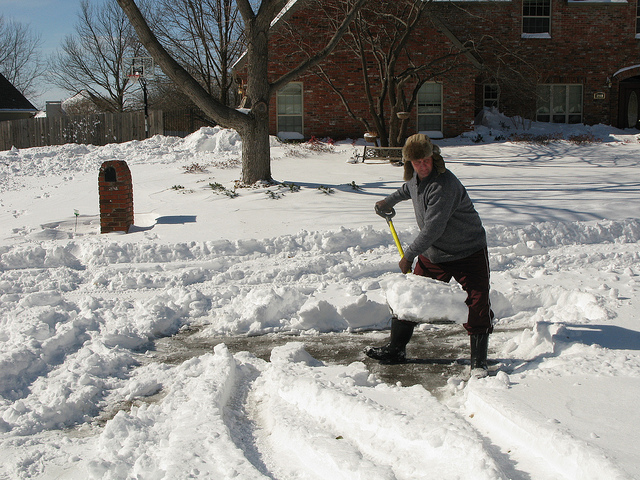Protect Your Heart While Shoveling

Unless you own a snowblower or have hired your neighborhood plow guy, you can most likely add shoveling your driveway/walkway after each snowfall to your winter to-do list. In fact, you’ve probably been out there in the wee hours of the morning a few times already in the past couple of months.
Shoveling does a body good, but still be careful
Shoveling is great exercise. Think about it: You’re using your entire body, especially your arms, back and core. You’re also giving your cardiovascular system a good workout, as evidenced by increased breathing, an elevated heart rate and probably some light perspiration. But, it can also be dangerous, particularly if your fitness level is not where it should be, you’re middle age or older or you have a heart condition. Going back a few years when I was a practicing cardiologist, all too often people would come in complaining about chest pain or, in the worst cases, suffering from a heart attack. One of the main culprits, especially during the winter, was shoveling snow.
Those most at risk for a heart attack include:
- Anyone who has already had a heart attack
- Anyone with a history of heart disease
- Anyone with high blood pressure or cholesterol levels
- Smokers
- Sedentary individuals
- People 60 and older
Heart attack warning signs
While some heart attacks are sudden and intense, others can start more slowly and cause only minor pain and discomfort. Often, when someone is having a heart attack, he or she may not know what’s wrong and will wait too long to get help.
Common symptoms include:
- Chest discomfort. Most heart attacks involve discomfort (pressure, squeezing, fullness or pain) in the center of the chest that lasts for a few minutes or goes away and returns.
- Discomfort or pain in other areas of the upper body, such as the arms, back, neck, jaw or stomach.
- Shortness of breath with or without chest discomfort.
- Breaking out in a cold sweat, nausea or lightheadedness.
If you do experience any of these symptoms, your best bet is to call 911. Emergency medical services staff can begin life-saving treatment immediately and get you to the hospital fast.
Pay attention to your heart’s health
According to the American Heart Association, the combination of colder temperatures and physical exertion while shoveling increases the strain placed on the heart. If you do decide to shovel after a heavy snowfall, just keep these suggestions in mind:
- Avoid caffeine or nicotine. Stimulants may increase your heart rate and constrict your blood vessels.
- Don’t eat a heavy meal before or soon after shoveling. Doing so can cause your heart to work harder than it should.
- Don’t drink alcohol before or immediately after shoveling. Alcohol may dull your senses and cause you to underestimate the amount of strain on your body.
- Stay hydrated by drinking water before, during and after you shovel.
- Dress in layers so you stay warm and can regulate your body temperature.
- Warm up your muscles by walking and stretching before you head out to shovel. Warm muscles are more efficient.
- Use a shovel with a smaller blade. It will lift less snow, but it will also reduce the strain on your heart. When possible, push the snow instead of lifting it.
- Begin slowly, pace yourself and take breaks.
- Stop if you feel any discomfort or pain.
Talk to your doctor
As with all physical activity, it’s a good idea to speak to your doctor first, especially if you’re inactive or have a history of heart trouble. He or she can provide some recommendations to follow and help identify any potential risks.
If you are dealing with a heart condition or another chronic illness, you can also receive guidance through the CDPHP Care Team.
Resolve to improve your fitness
Aside from reducing your risk for a heart attack caused by shoveling snow, or anything else, a regular exercise regimen will help you feel and look better, too. CDPHP® members can take advantage of free wellness and fitness classes.
Thankfully, you can take heart that winter only lasts a few months. Listen to your body, use common sense, and you’ll be feeling great just in time for spring.
 The Daily Dose
The Daily Dose
Comments are closed.